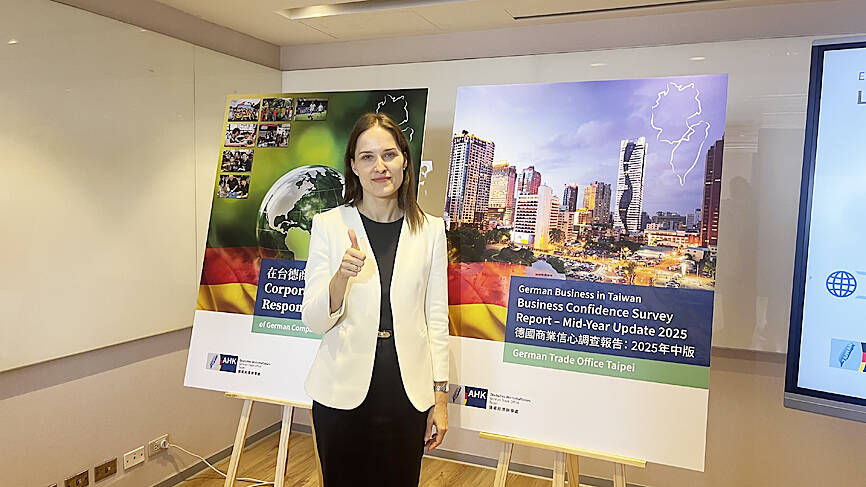Most German companies in Taiwan met their business targets in the first half of the year and remain confident of achieving their full-year goals, although US tariffs remain a key challenge, a German Trade Office (GTO) survey released yesterday showed.
The mid-year update of the German business confidence survey showed steady growth among German enterprises in Taiwan, despite global economic volatility.
More than 60 percent of respondents reached their business targets, with half reporting revenue growth, the survey showed.

Photo: Liao Chia-ning, Taipei Times
However, overall satisfaction with performance edged down, with fewer than half of companies expressing contentment with their results. Over the past three years, about half of German firms have outperformed their market averages, led by machinery, industrial equipment, electronics and computers, the survey said.
“Although US tariffs and global economic uncertainty persist, German companies continue to perform steadily and remain optimistic about Taiwan’s investment outlook,” GTO Chief Representative and Executive Director Eva Langerbeck said.
Looking ahead, one-third of German firms expect increased profits in the second half, while 18 percent forecast declines, the survey showed.
Nearly 70 percent went ahead with planned investments in the first half, with most making only minor adjustments for the remainder of the year, while 55 percent said they would stick to their existing strategies.
Nearly half of respondents expressed optimism about growth in their respective industries, particularly in machinery, electronics, energy and chemicals, it said.
Views in the machinery sector were more divided, with half expecting performance in line with the market and 38 percent looking at outperformance.
Taiwan’s appeal as an investment destination remains strong, as 65 percent of German firms rate it as equally or more attractive than other regional markets. Market size and growth potential were cited as the main draws, alongside Taiwan’s innovation ecosystem and well-developed infrastructure, it said.
On the downside, 59 percent of companies identified global economic growth as their top concern, followed by US tariffs and trade negotiations at 54 percent, the survey showed.
About one-quarter of respondents said they are affected by Taiwan’s import restrictions, which have led to higher costs, logistical uncertainty and delays in obtaining key components.
The GTO urged the government to foster a more business-friendly environment and ease import restrictions to support growth.
Other concerns cited included slow market development, Taiwan’s economic momentum and cross-strait relations, although the number of firms worried about cross-strait issues fell 15 percentage points from last year.

The number of Taiwanese working in the US rose to a record high of 137,000 last year, driven largely by Taiwan Semiconductor Manufacturing Co’s (TSMC, 台積電) rapid overseas expansion, according to government data released yesterday. A total of 666,000 Taiwanese nationals were employed abroad last year, an increase of 45,000 from 2023 and the highest level since the COVID-19 pandemic, data from the Directorate-General of Budget, Accounting and Statistics (DGBAS) showed. Overseas employment had steadily increased between 2009 and 2019, peaking at 739,000, before plunging to 319,000 in 2021 amid US-China trade tensions, global supply chain shifts, reshoring by Taiwanese companies and

Taiwan Semiconductor Manufacturing Co (TSMC, 台積電) received about NT$147 billion (US$4.71 billion) in subsidies from the US, Japanese, German and Chinese governments over the past two years for its global expansion. Financial data compiled by the world’s largest contract chipmaker showed the company secured NT$4.77 billion in subsidies from the governments in the third quarter, bringing the total for the first three quarters of the year to about NT$71.9 billion. Along with the NT$75.16 billion in financial aid TSMC received last year, the chipmaker obtained NT$147 billion in subsidies in almost two years, the data showed. The subsidies received by its subsidiaries —

Shiina Ito has had fewer Chinese customers at her Tokyo jewelry shop since Beijing issued a travel warning in the wake of a diplomatic spat, but she said she was not concerned. A souring of Tokyo-Beijing relations this month, following remarks by Japanese Prime Minister Sanae Takaichi about Taiwan, has fueled concerns about the impact on the ritzy boutiques, noodle joints and hotels where holidaymakers spend their cash. However, businesses in Tokyo largely shrugged off any anxiety. “Since there are fewer Chinese customers, it’s become a bit easier for Japanese shoppers to visit, so our sales haven’t really dropped,” Ito

OUTLOOK: Pat Gelsinger said he did not expect the heavy AI infrastructure investments by the major cloud service providers to cause an AI bubble to burst soon Building a resilient energy supply chain is crucial for Taiwan to develop artificial intelligence (AI) technology and grow its economy, former Intel Corp chief executive officer Pat Gelsinger said yesterday. Gelsinger, now a general partner at the US venture capital firm Playground Global LLC, was asked at a news conference in Taipei about his views on Taiwan’s hardware development and growing concern over an AI bubble. “Today, the greatest issue in Taiwan isn’t even in the software or in architecture. It is energy,” Gelsinger said. “You are not in the position to have a resilient energy supply chain, and that,